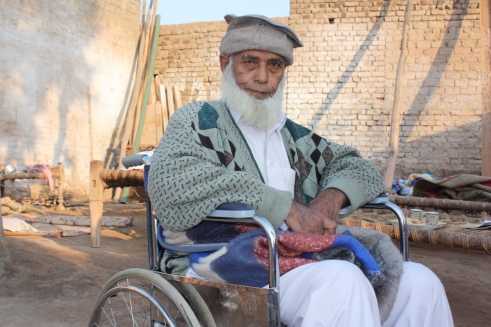By Irene van Horssen
HelpAge is starting a three-year programme to strengthen the capacity of humanitarian agencies to deliver age and disability inclusive emergency response, as part of the innovative portfolio of projects supported by the DFID Disasters and Emergencies Preparedness Programme (DEPP) and with separate funding from the OFDA.
In an emergency, older people and people with disabilities often do not receive the humanitarian assistance they need – although, together, they may constitute up to 25% of the affected population. They may be less mobile and unable to get to distribution sites or access other services. They may not be included as a target group for nutrition or livelihoods programmes. Humanitarian actors may think it is not possible to address the specific needs of older people and people with disabilities when time and resources are limited. Or sometimes they are excluded inadvertently, because they remain invisible to humanitarian actors.
Strengthening capacity
Shveta Shah, DEPP Portfolio Manager at the Start Network, said,
“This is a tremendously exciting initiative for the Network and for the DEPP programme. Not only will we be able to generate evidence for what works best in terms of mainstreaming capacity building approaches, but given the unique collaboration under the DEPP between DFID, Start Network and CDAC-Network, we hope this project can help a critical mass of actors in the sector to redefine how we approach vulnerability in humanitarian response.”
Working in partnership
To bring together all the necessary expertise to implement the programme, HelpAge works in a consortium with Handicap International, CBM International, RedR UK, Disaster Ready, IFRC and the Centre for Emergency and Development Practice at Oxford Brookes University.
Developing resources and giving long term support
In the coming three years we will:
- Develop resources on how to include older people and persons with disabilities in humanitarian programmes.
- Support eight humanitarian organisations in Kenya, Pakistan and the UK to mainstream ageing and disability into their humanitarian responses and organisational protocols.
- Develop capacity of local, national and international humanitarian actors to design and deliver inclusive and needs based humanitarian assistance.
- Disseminate evidence on effectiveness of inclusion of ageing and disability in humanitarian programmes.
Making humanitarian assistance inclusive
The programme aims to improve the quality of humanitarian assistance for older people and people with disabilities in times of crisis.
Frances Stevenson, Head of the Humanitarian Team at HelpAge, said,
“As aid actors become more aware of the impact that conflicts and disasters have on older people and people with disabilities, they have begun to think about the knowledge and skills they will have to develop in order to address their needs. This new project is going to provide this. We can expect it eventually to transform the way humanitarian actors – be they NGOs, UN agencies, governments or donors – address what has hitherto been a shameful gap in humanitarian response.”
The programme will provide training to increase humanitarian workers’ understanding of the needs and capacities of older people and people with disabiliies, the risks they face and how to identify and address these – equipping them to design and deliver inclusive response, by adapting existing programmes and setting up targeted activities where needed. As a result, older people and people with disabilities will receive humanitarian assistance that is accessible and appropriate, and that meets their needs.

